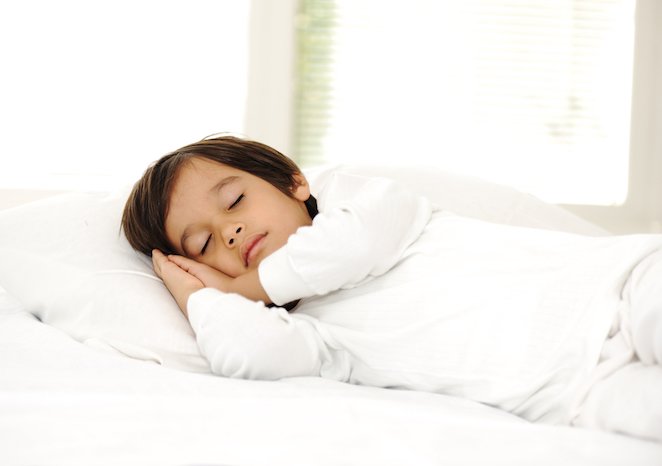Could A Good Night’s Sleep Help Treat ADHD?
Does your child wake up during the night?
Does they struggle to fall asleep or wake up in the morning?
Well, if they’ve been diagnosed with ADHD, sleep deprivation may be playing a huge role in their behavior.
It sounds counter-intuitive considering that children dealing with ADHD are bouncing off the walls with energy, but studies are showing a serious connection between ADHD symptoms and sleep (source).
Unlike adults who drag their feet after a night of tossing and turning, children tend to overcompensate for sleepiness by super-charging activity and energy. It’s well-known that sleep has a huge impact on brain performance. Proper rest enables our brain to function and focus, and this is where sleep troubles really show a tie to ADHD.
But how do we get a life-long restless sleeper or an anxious kiddo to change their sleep habits? It may seem impossible, but there are so many tools and approaches we can be using.
Sleep-Friendly Lighting
By now, we’re probably all aware that melatonin supplements can help sleep. But how many of us know that our bodies produce it naturally? As the sun sets and daylight grows dim, our brain kicks in production of this sleepy chemical. Then, when the sun rises and begins to light up the sky, melatonin levels drop off. Our bodies are tuned in to follow this natural cycle of light and darkness, and it works like a charm. At least until we flick on blaring overhead fluorescents.
See also: How to safely use lavender to help kids relax
We can help our whole family get a better night’s sleep by tweaking our evening lighting. Avoid blue-emitting lights like fluorescent and halogen bulbs as they mimic sunlight.
Red bulbs are best for night time lighting because they won’t interfere with the flow of melatonin, but parents like myself can stick to dimming the lights for a cost-effective and time-friendly alternative. For kiddos that insistent on the monster-protective powers of night lights, move it out of the bedroom and into a hallway or bathroom. And if the neighbors outdoor lights are beaming through their bedroom window, drapes or blackout curtains can be put up to keep their delta waves flowing through the night.
Electronic-Free Downtime
Television, computers, and electronic games have a negative impact on sleep because the electronic light taken in by our eyes sends messages to our brains and sets our circadian rhythm (source).
See also: How to set effective screen time limits
A nighttime routine can maximize sleep benefits by excluding electronics at least thirty minutes before kids are tucked into bed, but giving more than half an hour can only add to the bene’s of rest and relaxation. For an extra high-powered evening routine, throw in ADHD-specific diet and exercise considerations like a fruit-inspired dessert or a family walk around the block.
Nighttime Routine
All us parents have heard this one a hundred times, but it’s really that important. We don’t jump from treadmill to bed, and we don’t dive into work reports fresh from a party. In these cases, we need time to transition from active to relaxed, and from jovial to focused.
Mini adult humans are the same. Downtime helps them shift into the calm and relaxed state that good sleep requires. If we really want to vamp up our sleep campaign, we can develop a routine that includes safe sleep-supporting herbs and essential oils for tea, pillow sachets, and oil diffusers.
Quality Mattress
Adults know how important it is to sleep in a cozy bed, so it’s no surprise that kids will benefit from a quality non-toxic mattress. However, mattresses are especially important for children dealing with ADHD.
The everyday mattress is soaked with chemicals in the form of glues, adhesives, flame retardants, and on, and on. A child’s small body can respond to these allergens and toxins in a variety of ways, and some kids can have very strong reactions to them. ADHD shows potential connections to everything from environmental toxins to food dyes, so an organic chemical-free mattress is imperative to sleep and health alike.
Brainwave Music or Guided Relaxation
Science has discovered that the brain produces four different brainwaves; beta, alpha, theta, and delta. The delta brainwaves get special attention here, because delta brainwaves are the link to restorative sleep and REM cycles. Getting to delta waves requires a transition that shifts from one brainwave type to another and another.
A relaxing bedtime routine is an easy way to make the shift from human fireball to sleeping angel. Actually, some mellow pre-bed downtime may be all that kids need to saw logs throughout the night. But if kids are struggling to stay asleep or need some help getting into a restful frame of mind, then get help from sleep-inspired music. You can also try guided relaxation scripts or meditation audios to help your child fall asleep peacefully to the sound of positive affirmations. And it works just as well for kids as it does stressed out parents and sleepless infants.
Try out the tips above and see what it does for your kids. You may find that everyone sleeps better.
How’s that for a dream?

